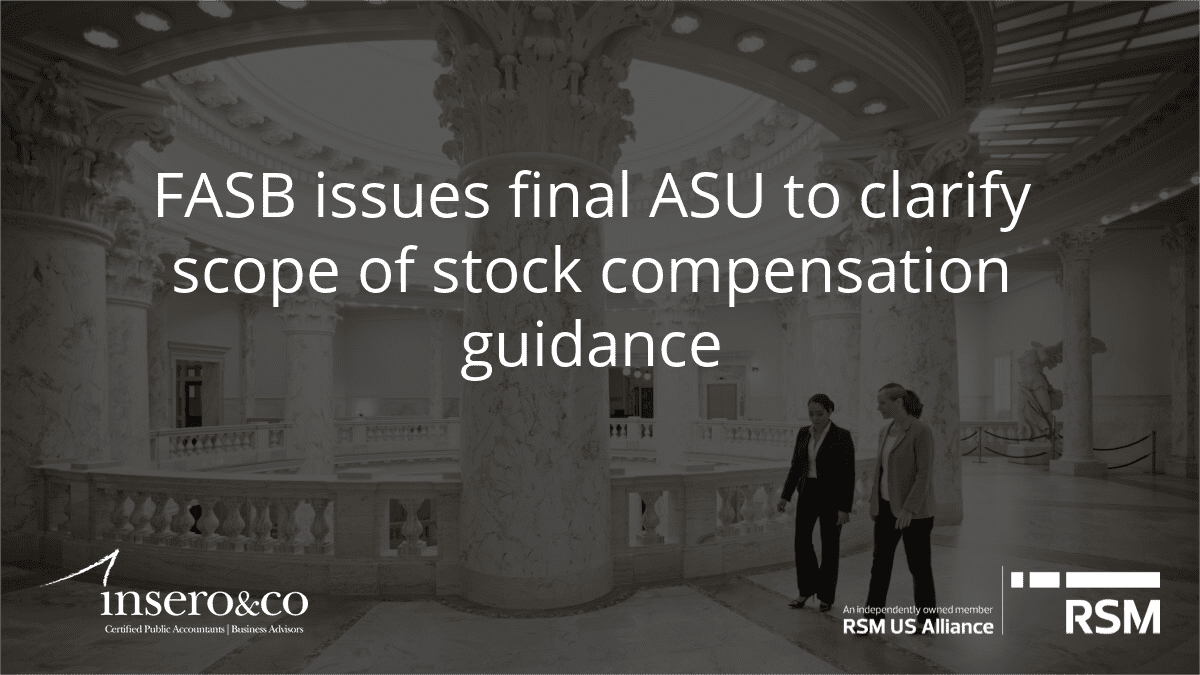INSIGHT ARTICLE |
Authored by RSM US LLP
This article was originally published on February 14, 2020
The Tax Cuts and Jobs Act (P.L. 115-97) reduced the federal tax liability of many individual taxpayers resulting in state and local tax liabilities becoming a larger portion of some taxpayers’ overall tax spend. Furthermore, the cap on the state and local tax deduction may disadvantage taxpayers residing in higher-tax states, such as California, Illinois and New York. But taxpayers located in certain jurisdictions with significant and ongoing state and local tax liabilities, or expecting future gains from the sale of a business or partnership interest, should carefully consider their individual tax planning.
For those that maintain roots in multiple states, tax planning may include minimizing individual income tax exposure by establishing a domicile in a lower tax jurisdiction. A quick internet search reveals a number of states without an individual income tax, including Alaska, Florida, Nevada, New Hampshire, South Dakota, Tennessee, Texas, Washington and Wyoming. That search may not reveal, however, that some of those states have taxes on certain interest and dividend income, or broad-based sales taxes imposed on most purchases. If you have worked in the tax accounting industry, or have even seen a movie or TV show, you may already know that Florida is one of the most popular destinations because of the beautiful beaches and weather and, most importantly, the absence of an individual income tax.
Fair warning
Taxpayers looking for a reprieve from high individual income taxes should tread carefully by performing their due diligence. The states are very aware of such tax avoidance strategies and many aggressively audit suspicious part-year and non-resident filings as a Massachusetts taxpayer recently discovered. The taxpayer had filed three consecutive years of Massachusetts nonresident/part-year resident returns beginning in 2010 after purchasing property in Florida. Massachusetts subsequently audited the taxpayer finding that the taxpayer continued to be domiciled in Massachusetts for each of the years in question. An appeal to the Appellate Tax Board (“ATB”) followed.
Shortly before the tax years at issue, the taxpayer and his wife and four sons, lived in a 60-acre property in Cape Cod that received significant renovations to a 5,000 square-foot farmhouse and on-site “indoor sports complex.” In the mid-90s, the taxpayer founded a consulting and software business located in Massachusetts. The taxpayer and his wife served in various corporate positions of the business before ultimately selling in late 2012. The taxpayer also owned various tickets to Massachusetts professional sports teams including eight club-level season tickets for the Patriots, had access to season tickets to the Red Sox, and his business owned suites where the Boston Celtics and Bruins played.
In mid-2010, the taxpayer and his family purchased a house in Miami. In the same year, the taxpayer made a charitable contribution to the University of South Florida, obtained a Florida driver’s license and registered to vote in the state. Under audit, the taxpayer argued that he lived a separate life from his wife and that they maintained separate domiciles, his wife in Massachusetts, and himself in Miami.
In 2010 and 2011, the ATB found that he had spent more days in Massachusetts than Florida, and in 2012, spent 153 days in Massachusetts and 157 days in Florida. Testimony indicated that the taxpayer had a close relationship with his wife and enjoyed many activities with her and their sons who mostly attended high school in Massachusetts during the years at issue. While the taxpayer had personal effects in Florida, the ATB found that the “crux” of the taxpayer’s family life was in Massachusetts, where he was actively involved in his family’s life, enjoyed Massachusetts sports, golfed and boated, received primary medical care, and had stronger business ties to Massachusetts. And although the taxpayer registered to vote in Florida, he did not do so until 2016.
In planning, the taxpayer received advice from his accountant and performed independent internet research before taking a series of steps to evidence a change of domicile by obtaining a driver’s license, registering to vote and executing estate-planning documents to reflect the Florida address. By examining the taxpayer’s activities, relationships, real estate, medical care and business operations, the ATB found that the taxpayer’s life remained in Massachusetts. Importantly the ATB found that “ministerial steps” (such as obtaining a driver’s license, registering to vote, updating estate documents) alone could not establish a change in domicile.
Lessons learned
It is important for taxpayers to plan for a residency change well in advance due to the complexities involved. Notably, it has been common for state taxing authorities and courts to call into question changes in residency where taxpayers relocated with the sole intent to reduce tax liabilities, even in cases where the taxpayer registered a car, cast a vote and purchased a home in the new jurisdiction. There are dozens of factors that taxpayers should review when considering tax minimization planning through residency changes.
A residency analysis may be very fact specific, with the ultimate goal of determining the taxpayer’s true intent. A few questions to consider in determining whether a change in residency has occurred:
- Does the state maintain a statutory length of stay to qualify as a resident, i.e., 183 days?
- Are you registered to drive and/or vote in the state?
- Do you own or lease property in the state?
- Are you employed in the state?
- Is your family located in the state?
- Have you made other affirmative actions indicating your intent to stay permanently?
Taxpayers should understand that no one factor is determinative. Under audit, a state will look closely at whether there is substance to a change in residency and not just a change in address only. In the past, states have relied on factors such as the location of the taxpayer’s beloved dog to find a change of domicile had not occurred.
Additionally, general residency planning should consider all state and local tax burdens, including property taxes and sales and use taxes. Taxpayers should also consider the impact of residency changes on social security benefits, pension income, retirement plan distributions, inheritance taxes, and other estate and gift tax obligations.
For another cautionary tale, please read our article Multiple residences, one domicile: where is income reported?
Do you have questions or want to talk?
Call us at (800) 232-9547 or fill out the form below and we’ll contact you to discuss your specific situation.
This article was written by Mo Bell-Jacobs, David Brunori , Brian Kirkell, Carol Warley and originally appeared on 2021-09-20.
2021 RSM US LLP. All rights reserved.
https://rsmus.com/what-we-do/services/tax/state-and-local-tax/residency-planning-lessons-more-than-an-internet-search-required.html
The information contained herein is general in nature and based on authorities that are subject to change. RSM US LLP guarantees neither the accuracy nor completeness of any information and is not responsible for any errors or omissions, or for results obtained by others as a result of reliance upon such information. RSM US LLP assumes no obligation to inform the reader of any changes in tax laws or other factors that could affect information contained herein. This publication does not, and is not intended to, provide legal, tax or accounting advice, and readers should consult their tax advisors concerning the application of tax laws to their particular situations. This analysis is not tax advice and is not intended or written to be used, and cannot be used, for purposes of avoiding tax penalties that may be imposed on any taxpayer.
RSM US Alliance provides its members with access to resources of RSM US LLP. RSM US Alliance member firms are separate and independent businesses and legal entities that are responsible for their own acts and omissions, and each are separate and independent from RSM US LLP. RSM US LLP is the U.S. member firm of RSM International, a global network of independent audit, tax, and consulting firms. Members of RSM US Alliance have access to RSM International resources through RSM US LLP but are not member firms of RSM International. Visit rsmus.com/aboutus for more information regarding RSM US LLP and RSM International. The RSM(tm) brandmark is used under license by RSM US LLP. RSM US Alliance products and services are proprietary to RSM US LLP.

Insero & Co. CPAs, LLP is a proud member of RSM US Alliance, a premier affiliation of independent accounting and consulting firms in the United States. RSM US Alliance provides our firm with access to resources of RSM US LLP, the leading provider of audit, tax and consulting services focused on the middle market. RSM US LLP is a licensed CPA firm and the U.S. member of RSM International, a global network of independent audit, tax and consulting firms with more than 43,000 people in over 120 countries.
Our membership in RSM US Alliance has elevated our capabilities in the marketplace, helping to differentiate our firm from the competition while allowing us to maintain our independence and entrepreneurial culture. We have access to a valuable peer network of like-sized firms as well as a broad range of tools, expertise, and technical resources.
For more information on how Insero & Co. CPAs can assist you, please call (800) 232-9547.




